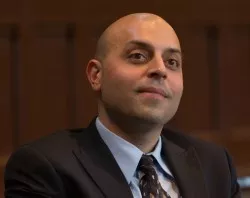Sa'ed Atshan ’06
Associate Professor
Department Chair, Peace & Conflict Studies
Peace & Conflict Studies
Sociology & Anthropology
Contact

Personal Website: atshan.net
Dr. Sa’ed Atshan is Associate Professor of Peace and Conflict Studies and Anthropology and Chair of the Department of Peace and Conflict Studies at Swarthmore College.
He previously served as an Associate Professor of Anthropology at Emory University, as a Visiting Assistant Professor of Anthropology and Senior Research Scholar in Middle Eastern Studies at the University of California, Berkeley, and as a Postdoctoral Fellow at the Watson Institute for International Studies at Brown University.
Atshan earned a joint PhD in Anthropology and Middle Eastern Studies (2013), with a medical anthropology emphasis, and MA in Social Anthropology (2010), from Harvard University; a Master in Public Policy (MPP) (2008) from the Harvard Kennedy School; and BA (2006) from Swarthmore College.
His areas of research include: a) health and humanitarianism, b) contemporary Palestinian society and politics, c) global LGBTQ social movements, and d) Christian minorities in the Middle East.
Atshan is the author of Queer Palestine and the Empire of Critique (Stanford University Press, 2020). He is also the coauthor, with Katharina Galor (Judaic Studies, Brown University), of The Moral Triangle: Germans, Israelis, Palestinians (Duke University Press, 2020). The German translation of The Moral Triangle is entitled Israelis, Palästinenser und Deutsche in Berlin: Geschichten einer komplexen Beziehung (De Gruyter, 2021). Atshan and Galor also coedited the volume, Reel Gender: Palestinian and Israeli Cinema (Bloomsbury, 2022).
His forthcoming book, In A Land of Aid: Essays on the Palestinian Condition, will be published with Stanford University Press in November 2026. The manuscript, authored by Atshan, explores the enduring nature of humanitarianism in the West Bank and Gaza Strip and how Palestinians endure their lives as humanitarian subjects. This work is at the intersection of the anthropology of policy, medical anthropology, and feminist anthropology.
Atshan has recently embarked on two new projects. One is researching the convergent and divergent experiences of African-American and Palestinian Quakers, with an emphasis on the intersection of race and Christianity in the United States and Palestine/Israel. This project is entitled, “Can the Subaltern Quaker Speak?: Alienation and Belonging among Black and Palestinian Friends.” The other, “Queer Imaginaries and the Re-Making of the Modern Middle East,” is in collaboration with Phillip Ayoub (Political Science, University College London). Atshan and Ayoub are researching LGBTQ activism across the Middle East and North Africa region.
Atshan's work has appeared or been referenced in media outlets including The Advocate, Friends Journal, Foreign Affairs, Gay Times, Georgia Voice, Harvard Gazette, Huffington Post, Jadaliyya, Jacobin, Jewish Journal, Libération, London Review of Books, Los Angeles Blade, Los Angeles Times, The Guardian, The Nation, The New Yorker, The New York Times, NBC, NPR, Open Democracy, Oxford Society for International Development Podcast, Philadelphia Inquirer, Sojourners, Tel Aviv Review of Books, Them, Truthout, University of California Television, Washington Blade, Washington Post, and Washington Report on Middle East Affairs, among others.
He has been awarded numerous grants and fellowships, including from the Carter Center, Open Society Foundations, Rosa Luxemburg Foundation, National Science Foundation, Social Science Research Council, Woodrow Wilson National Foundation, Andrew Mellon Foundation, and the Jack Kent Cooke Foundation. He is also the recipient of a Paul and Daisy Soros Fellowship for New Americans and a Kathryn Davis Fellowship for Peace. In 2022, Dr. Atshan was inducted into the Martin Luther King, Jr. Collegium of Scholars at Morehouse College.
He is currently President of the Association of Middle East Anthropology (AMEA) of the Middle East Studies Association (MESA). Atshan has previously served as the policy and law book reviews editor for the International Journal of Middle East Studies (IJMES), on the board of the Palestinian American Research Center (PARC), and on the editorial committee of the Journal of Palestine Studies (JPS). He was also an elected board member for the Middle East Section (MES) of the American Anthropological Association (AAA).
Dr. Atshan’s community-based volunteer work is primarily with Quaker civil society organizations (also known as the Religious Society of Friends). He has served as an advisor to Quaker institutions including the Ramallah Friends School, on the multicultural board of Westtown School, on the Corporation of Haverford College, as a spiritual nurturer for the Quaker Voluntary Service (QVS), on the General Committee and Policy Committee of the Friends Committee on National Legislation (FCNL), and on the Board of Pendle Hill. He also served as a board member for the American Friends Service Committee (AFSC) where he was Clerk of the Standing Nominating Committee and Clerk of AFSC's Community, Equity, and Justice Board Committee.



